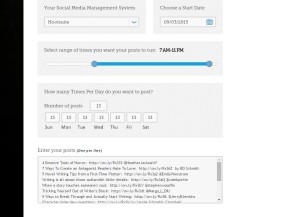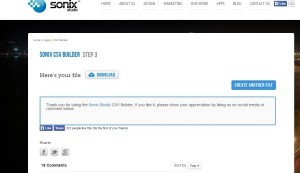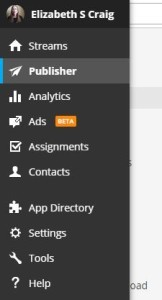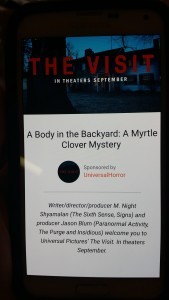Elizabeth Spann Craig's Blog, page 115
September 19, 2015
Twitterific Writing Links
by Elizabeth S. Craig, @elizabethscraig
Twitterific writing links are fed into the Writer’s Knowledge Base search engine (developed by writer and software engineer Mike Fleming) which has over 30,000 free articles on writing related topics. It’s the search engine for writers.
(developed by writer and software engineer Mike Fleming) which has over 30,000 free articles on writing related topics. It’s the search engine for writers.
How Not to Collaborate on a Story: http://ow.ly/SaMmm @davey_beauchamp
How to Be a Better Writer: Turn Struggle Into Success: http://ow.ly/SaIAI @hughosmith
Great Character: Karl Childers (Sling Blade”): http://ow.ly/SaKPa @gointothestory”
Introducing Characters in a Scene: http://ow.ly/SaMBg @Janice_Hardy
How to Create a Remarkable Villain (Beyond the Clichés: ) http://ow.ly/Se7N6 by David Villalva @betternovelproj
On Story Prep: http://ow.ly/Se7Ip @gointothestory
How to Write a Bio to Turbocharge Our Guest Posts: http://ow.ly/Se898 @RidethePen
Plane Crashes and Writing: 6 Sources of Common Ground: http://ow.ly/Sea0g @jan_ohara
Is our crit partner worth the stress? http://ow.ly/Seaj7 @nicholesevern
Effective Ways to Make Characters More Memorable: http://ow.ly/Se9ES @DeanElphick
4 Benefits of Pre-Writing: http://ow.ly/SaIK3 @ink_and_quills @shesnovel
Negotiate Contracts Like a Pro: http://ow.ly/SaHMh @susanspann
Symbolism in our writing: http://ow.ly/SaI4B @SonjaYoerg
10 Bad Writing Habits to Break: http://ow.ly/SaKvn @WritersCoach
11 Problems All Writers Face: http://ow.ly/SaLV7 @cheryljmuir
The Dos and Don’ts of Character Bios: http://ow.ly/SaJP4 @ink_and_quills
100 Writing Practice Lessons & Exercises: http://ow.ly/SaLu2 @write_practice
3 Steps for Creating Realistic Fantasy Races and Creatures: http://ow.ly/SaJjX @ink_and_quills
Find an Extra Hour Every Day With a 5-Minute List: http://ow.ly/SnvFN @jenn_mattern
On author surveys: #FutureChat 4pBST / 11aET (now) @Porter_Anderson
A look at recent author surveys: http://ow.ly/Snvu0 @Porter_Anderson @futurebook
What does it take to be a successful indie writer? http://ow.ly/S8Qkr @ShawnInmon
The appeal of the traditional mystery: http://ow.ly/Sny5Z @mkinberg
3 Tips for Writing More Concisely: http://ow.ly/S8PQp @AnneGreenawalt
26 Creative Ways to Publish Social Media Updates: http://ow.ly/S8PVs @smexaminer @aliventures
Why Change Your Book Cover Artwork? http://ow.ly/S8QhC @RachelAmphlett @mollygreene
5 Hacks to Create a Good Writing Habit: http://ow.ly/S8Qbm @joebunting
How to Plot a Romance Novel: http://ow.ly/S8Q53 @nownovel
6 ways to work past blogger’s block: http://ow.ly/S8PYY @the writersasst
5 Absolute Dimensions of Character Personality: http://ow.ly/S8PSU @writingeekery
Legality of pseudonyms: http://ow.ly/S8Qsh @Janet_Reid
The Second Draft: http://ow.ly/S8PPw @mbtinsley
Tips for Building A Winning Social Media Marketing Strategy: http://ow.ly/S8Q39 by Elna Cain
Tips for starting a newsletter: http://ow.ly/S8Qeu @bookgal
How To Get Back Into Writing (Once You’’ve Lost Your Groove): http://ow.ly/S6AXa @MudpieWriting
The Authors Guild Survey’s Self-Selected Sample: More Fuel On The Fire? http://ow.ly/Sk2XU @Porter_Anderson @barryeisler
Writing Strong Scenes: 5 Tips http://ow.ly/S6BAX @angee
Writing Your Book’s Back-Cover Copy: http://ow.ly/S6BPr @JRHwords
5 Ways to Make the Most of Your Writing Workshop: http://ow.ly/S6Bx7 @BernadetteMung
How to Set Readers Up For Success: http://ow.ly/S6AAU @denisedrespling
Growing your vocabulary by using etymology: http://ow.ly/S6BNc @kseniaanske
8 Things to Know (From a Former Journalist): http://ow.ly/S6AKe by R.G. Belsky
17 Screenwriting Scenes To Use In Your Novel: http://ow.ly/S6Bmy @writers_write
What Writers Can Do When Writing Advice Conflicts: http://ow.ly/S6BIL @MandyCorine
Use Facebook to Sell Books: http://ow.ly/S6zPS @pbackwriter
5 Things Productive Writers Do Differently: http://ow.ly/S6Bse @joebunting
How to Choose Amazon Keywords: http://ow.ly/S6Ahy @davidpenny_
AuthorEarnings: With a Dose of Hype: http://ow.ly/Sheyt @Porter_Anderson @ThoughtCatalog
4 Key Ways to Ramp Up Tension and Pacing in Our Fiction: http://ow.ly/S1EK5 @CSLakin
Which are the Best Email Service Providers for Writers? http://ow.ly/S1F44 @GaryJMcLaren
Worldbuilding for Urban Fantasy: http://ow.ly/S1Go2 @howtobeamazing
7 Ways to Become a Better Writer in 7 Days: http://ow.ly/S1H9A @marcykennedy
Should Indie Authors Worry About Piracy? http://ow.ly/S1F6U @BookWorksNYC @stapilus
Villains: The Real Stars: http://ow.ly/S1GVU @willvanstonejr @K8Tilton
18 steps to a successful book marketing campaign: http://ow.ly/S1FhN @WesJThomas
Where Indie Authors Should Sell Their Books: 7 Retailers: http://ow.ly/S1FXH @MSaintGermain
21 Writing Quotes on Getting Started: http://ow.ly/S1EST @GaryJMcLaren
Self-Publishing for Author/Illustrators: http://ow.ly/S1GKJ @Skipper_Bay
5 Reasons Authors Need Goodreads: http://ow.ly/S1FPN @terrywhalin
Growing Our Character Relationships to Grow Our Character: http://ow.ly/S1Gxk @Saboviec
Soundtracks For Books: How One Novelist Is Using Booktrack: http://ow.ly/S0pgn @ADStarrling @thecreativepenn
Is it Time to Say Goodbye to Microsoft Word? http://ow.ly/S0p1u @GaryJMcLaren
How to Write 5,000 Words a Day: http://ow.ly/S0bVF by Bamidele Onibalusi
No time to Write? A 3-Step Solution. http://ow.ly/S0bJM @RuthanneReid
The Fairy Tale Formula: How To Write A Case Study In 3 Easy Steps: http://ow.ly/S0bN4 @AnthonyEhlers
15 Compelling Reasons to be a Writer: http://ow.ly/S0oMc @GaryJMcLaren
Quirky Sources to Make Your Story a Winner: http://ow.ly/S0bsu @diannmills
A-Z Social Media Prompt: http://ow.ly/S0olt @JayArtale
Does an Author Really Need a Website? http://ow.ly/S0osF from Fix My Story
A Book Promo Cheat Sheet: http://ow.ly/S0bzR @JBennett111
How To Think about Multiple Points of View: http://ow.ly/S0c5s @patverducci
Scrivener: Re-outline, Reorder, Rewrite: http://ow.ly/S0oAw @YK_Greene
Fast Writers and Slow Writers: http://ow.ly/ScQiV
Why Scene Making is a Great Idea: http://ow.ly/RVe3f @lindasclare
Do You Still Need a Website as the Core of Your Online Platform? http://ow.ly/RYlch @karencv
The Socially Awkward Writer: http://ow.ly/RYl7Q @sarahcallender
Issues with the Audiobook Market: http://ow.ly/RYlJ6 @inkbitspixels
AI assesses the tone of our writing: http://ow.ly/RYlSo @bookworksnyc @roncallari
22 Ways a Blog Can Sell Books: http://ow.ly/RYm2n @JFBookman
How to Tackle List Building: http://ow.ly/RYlzw @KathleenGage
Remember that what you’re linking to on Twitter needs to be professional: http://ow.ly/RYlfT @booklaunchdemon
Define and Attract Your Target Audience: http://ow.ly/RYkQx @writerplatform
Should You Hire a Professional Book Cover Designer? http://ow.ly/RYl1W @ericaverrillo
4 Reasons Readers Don’t Buy Our Books: http://ow.ly/RYmae @Nick_Stephenson
The Harsh Truth Behind Print Sales: http://ow.ly/RYkMZ @lgoconnor1
7 Reasons Twitter is Great for Writers: http://ow.ly/RYmeZ @CaballoFrances
The links I shared last week: http://ow.ly/S8T39 .All the links (30K+) I’ve ever shared, free and searchable: writerskb.com
Not every indie writer finds success: looking for truth in time of hype: http://ow.ly/S8MME @Porter_Anderson @writerunboxed
What to Avoid in Our Cover Copy: http://ow.ly/RVf3d @ceciliaedits
The Hot Sheet: industry newsletter for authors (30 day free trial): http://ow.ly/S8KyU from @Porter_Anderson & @JaneFriedman”
10 Tools to Keep Writers Out of the Doctor’s Office: http://ow.ly/RVeSy @colleen_m_story
Writing mistakes to avoid: http://ow.ly/RVfoc @rxena77
14 Points To Consider Before Writing The Ending: http://ow.ly/RVdRf @writers_write
7 Things Learned about Day Jobs and Writing: http://ow.ly/RVeX8 @MRansomBooks
4 Reasons to Write Non-visual Description: http://ow.ly/RVeI3 @mrJRPatterson @thePenleak
29 Plot Templates: http://ow.ly/RVehy @fictionnotes
Last week's top writing links on Twitterific:
Click To Tweet
The post Twitterific Writing Links appeared first on Elizabeth Spann Craig.
September 17, 2015
Writing the Cozy Mystery—the Victim
By Elizabeth S. Craig, @elizabethscraig
This is the third in my cozy mystery writing series. Today I’m taking a closer look at our victim. Parts one and two can be found here and here.
Handling our victim’s demise: As I mentioned in an earlier post, you can handle this a couple of different ways. You can show the reader the likely suspects and why the victim might have been killed during interactions between future suspects and future victim at the start of the book (victim is still alive as the story opens). Or you can open the story with the victim’s body and have the sleuth figure out who the suspects are and the motive (slightly trickier, I think).
Another tricky victim area: likeability. If the victim is too unlikeable, readers may not care if his murder is solved or not. Although it does make it easy in terms of motive. If you’ve got a very unlikeable victim, might be a good idea for the sleuth to remind others that justice is still important (as Hercule Poirot did in Agatha Christie’s mysteries). Or we could consider having someone close to the sleuth or the sleuth herself under suspicion to give the reader extra incentive to find out whodunit.
If the victim is too likeable, it can be hard to realistically imagine 4-5 people who would want to do away with him. In that case, you might want to uncover backstory on the victim that shows him in a new and unflattering light. Or show that the victim’s life is a carefully constructed lie. This can be a fun approach and one that typically adds a lot to the word count, for you short writers out there.
The suspects are never strangers to the victim in a cozy. The victim’s death has a purpose.
The victim’s death. There are lots of different ways to murder someone. If this is a cozy, the murder should be offstage and not described in graphic terms. Since forensics doesn’t play a heavy role in these books, the information you do supply (particularly in terms of guns) needs to be accurate. There are good resources available to help you with the crime itself. Crime writer Sue Coletta has a great blog and nice list of resources, doctor and writer D.P. Lyle has helpful information for writers (see his sidebar near the middle of the page for searchable categories), and crime writer Fiona Quinn has informative interviews on her blog, along with a nice list of resources. Another good roundup of resources is provided by Klariza (who, in the bizarre tradition of Tumblr…sigh… goes only by a first name). Crime writer Clarissa Draper has a nice series of poisons on her blog.
An additional victim? I like two victims in my books. The second body shows up about halfway through the book and is frequently one of the suspects who seems most likely to have murdered the first victim.
We probably should avoid (particularly if we’re trying to sell the book to traditional cozy publishers): having children as victims in the cozy mystery (unless the child is particularly unpleasant or a much older child. Even then, I’d think twice). And, if you’re contemplating killing a dog or cat in a cozy mystery…I’d seriously reconsider.
What other aspects of the victim do you mystery writers and readers like to consider?
Tips for creating a better crime fiction victim:
Click To Tweet
Image: MorgueFile: Dodgerton Skillhause
The post Writing the Cozy Mystery—the Victim appeared first on Elizabeth Spann Craig.
September 13, 2015
Fast Writers and Slow Writers
By Elizabeth S. Craig, @elizabethscraig
The prevailing advice for better sales seems to be to write faste r. I think this may be true. I did find that my self-published sales really picked up after book three so why not get to book three faster, right?
r. I think this may be true. I did find that my self-published sales really picked up after book three so why not get to book three faster, right?
But this is frustrating advice for writers. Some writers have demanding schedules in which it’s tough to schedule in writing time. Some are just thoughtful writers who take either a lot of time to warm up or who are deliberate about their word choice or story direction.
I read a post by Ken Rahmoeller last week on his blog: “Being a Slow Writer in This Day and Age.” Ken expressed his worry about being a slow writer when the trend is to fly through writing and production.
As many before me have pointed out, this business is a marathon, not a sprint.
You are not behind. If you feel you need to catch up, it may stress you out more.
One book is better than no book.
What you probably shouldn’t do if you have only one book:
Facebook ads
Long-term free book strategies
Extensive social media platform building.
What you might want to consider if you have only one book:
Ways to get more reviews/reads. Consider Goodreads giveaways and short term free promos (some will disagree with me here, but I do think the reviews are worth any loss of sales).
Put time into building a decent website instead of updating on every social media platform. See industry expert Jane Friedman’s post, “The Basic Components of an Author Website.”
Build up subscribers to your newsletter by having the link in your email signature, on your website, and in the back of your book. Another nice article from Jane Friedman on the how-tos: “Email Newsletters for Authors: Get Started Guide.”
But do reserve your name on various social media platforms for later. We need to build our online profile around our name, not our book.
Continue setting time aside for both reading and writing.
Make manageable goals for the writing. And I mean manageable. Set the bar low. It’s more important to build the habit than it is to score a bunch of words.
Never try to catch up.
Remember…even if it takes you more than a year to write a book, you’re still on par with trad published authors. My books were in production forever.
If you want to write faster, here are some tips:
Consider outlining. Might mean that you need to fluff up any flatness later, but if you try this approach, you may find your speed increases dramatically. Results vary, but might be worth a go.
If you don’t want to outline, consider just a two sentence directional prompt for the following day at the end of your writing session.
Get your head into your writing before you open your laptop. Think about your story as you’re getting your coffee in the morning, eating your breakfast, pulling out your laundry, driving home from the store. Prime the pump before you sit in front of your text.
If there are particular elements of writing that are bound to slow you down (character naming, research, writing description), bundle those together to knock out all at once and after the first draft is completed. Mark the omission in your manuscript so that you can find it later (track changes comments, highlighter on Word, or using ***).
Learn how to write in short blocks of time. Learn how to write when surrounded by distractions. Learn how to write when on the go (dead time in doctor’s office waiting rooms, carpool lines, during commutes). Upload your book to Google Drive or Microsoft OneDrive so your book and/or outline will always be with you.
But…you don’t have to write faster. Especially not if it means writing faster makes you not want to write at all.
Do you consider yourself a fast or slower writer? What do you think of the advice to write faster?
The post Fast Writers and Slow Writers appeared first on Elizabeth Spann Craig.
September 12, 2015
Twitterific Writing Links
by Elizabeth S. Craig, @elizabethscraig
Twitterific writing links are fed into the Writer’s Knowledge Base search engine (developed by writer and software engineer Mike Fleming) which has over 30,000 free articles on writing related topics. It’s the search engine for writers.
(developed by writer and software engineer Mike Fleming) which has over 30,000 free articles on writing related topics. It’s the search engine for writers.
Auto mechanics in crime fiction: http://ow.ly/S4ROM @mkinberg
Pottermore: a look at the site’s changes and new focus: http://ow.ly/S71lP @Porter_Anderson
How to Raise the Creative Bar: http://ow.ly/RNYi7 @ArtistThink
5 Things Every Protagonist Needs: http://ow.ly/RNXUm @larin20
Breathing life into our characters: http://ow.ly/RNYmL @shalvatzis
A chart for budgeting your writing time by tracking activities: http://ow.ly/RNYc2 from Writing Questions Answered
5 Keys to an Effective Query: http://ow.ly/RNYpM by Claudia Cangilla McAdam
Writing Research: How to Do it and Use It: http://ow.ly/RNXzw @SandraDanby
Print Book Production for indie authors: http://ow.ly/RNXg4 @JALangAuthor
5 Favorite Free Fonts for Interior Book Design: http://ow.ly/RNX9g @JFBookman
11 Ways to Ask for Writing Advice (And 10 Major Mistakes to Avoid): http://ow.ly/RNXRW @CordeliaCallsIt
The 120 Most Helpful Websites For Writers in 2015: http://ow.ly/RNWJC @geediting
Flat book cover design: Why do all the summer novels have the same look? http://ow.ly/RNWZX @heathertwit
10 Tips to Get Things Done (for Writers): http://ow.ly/RNYac @monicamclark
Writers shouldn’t fear online reviews: http://ow.ly/RQQXm by Tara and Stefan Tobler @guardianbooks
How YouTube Can Help Self-Published Authors: http://ow.ly/RQQLx @DigiBookWorld
Worldbuilding in Star Wars: http://ow.ly/RQQwv @authorjsmorin
Naming Your Characters: Mistakes to Avoid: http://ow.ly/RQQQM @mossifer
The Myth of The Lazy Writer: http://ow.ly/RQQHs @HughHowey
The Lure of Romance Writing (and Earnings) for the Literary Set: http://ow.ly/RQQuB @JaneFriedman
When we have a lack of plot and motive: http://ow.ly/RQQON @glencstrathy
Do We Have What Publishers Really Want? http://ow.ly/RQR3d from The Writer’s Society
5 Reasons We Can’t Build Our Author Platform on Amazon, Facebook, or Google: http://ow.ly/RQRaQ @DIYAuthor
Make lists to advance your story: http://ow.ly/RQQJy @kayedacus
Dimensional Characters: —Beyond the Wound & Into the Blind Spot: http://ow.ly/RQQTu @kristenlambtx
Script Analysis: “Birdman”: Scene By Scene Breakdown: http://ow.ly/RQR4X @gointothestory
How to Tell If Your Character Has Dependent Personality Disorder: http://ow.ly/RVeBW @writerology
Is something missing from my story? http://ow.ly/RVebn @gointothestory
10 Tools to Keep Writers Out of the Doctor’s Office: http://ow.ly/RVeSy @colleen_m_story
The Micro Story: http://ow.ly/RVeME from Shawn Coyne
Is Our Manuscript Ready to Submit? Tips for Knowing: http://ow.ly/RVevd @fictionnotes
Macro And Micro Editing Tips: http://ow.ly/RVe7a @angee
10 Ways To Create A Near-Future World That Won’t Look Too Dated: http://ow.ly/RM6ot @charliejane @io9
Fears About Ideas Being Stolen: http://ow.ly/RM6uC from The Writing Cafe
Using the Fallacy of Memory to Create Effective Memoir: http://ow.ly/RM61m @wendymfontaine @JaneFriedman
How to Create Tension in Writing: http://ow.ly/RM66P @nownovel
7 Brutally Honest Self-Publishing Tips: http://ow.ly/RM5in @TherinKnite
Tricks to Use to Pace Your Novel: http://ow.ly/RM5qW @ajhumpage
16 Query Tips From Literary Agents: http://ow.ly/RM6k8 @AskATechTeacher
Creating multi-layered writing: http://ow.ly/RM5Zx from Writing Questions Answered
The simple story of a dog and why it makes you cry: http://ow.ly/RM5G6 @speechwriterguy
8 reasons why blockbusters are meta-stories: http://ow.ly/RM5Tr @speechwriterguy
3 Technologies Dropped for Breaking the Show: http://ow.ly/RM69S @cinehead
3 Easy Steps to Crafting a Language for Your Fantasy Novel: http://ow.ly/RM6qM @lucid_ghost
When the agent is the author: Andrew Lownie: http://ow.ly/S0pJe @andrewlownie @Porter_Anderson
15 Common English Words That Are Still Trademarked: http://ow.ly/RLtON @io9 by Katharine Trendacosta
Memoir Writing: Top 5 Things to Expect after You Launch Your Book: http://ow.ly/RLq7p @pmilana
6 Ways to Make Ordinary Protagonists Extraordinary: http://ow.ly/RLsFu @emily_tjaden
Book Discovery Strategy: Social Media Events: http://ow.ly/RLrEj @amcbooks
4 Surefire Ways to Bore Your Readers to Death: http://ow.ly/RLqd1 by Melissa Chu
Between First Draft and Test Readers: http://ow.ly/RLqqC @artofstoriesAB
10 Ways to Improve Your Writing While Thinking Like a Comedy Writer: http://ow.ly/RLrTD @lajfun
How to Write Horror Fiction and Avoid Typical Horror Genre Clichés: http://ow.ly/RLsat @crisfreese
Science Fiction Writing: a Choice of Futures: http://ow.ly/RLqNu @nevalalee
How to Deal With Harsh Criticism of Your Writing: http://ow.ly/RLt66 @io9 @charliejane
Crisis is conflict on steroids: http://ow.ly/RLpRR @stephenwoodfin
Understanding Screenwriting (with Films as Examples): http://ow.ly/RLq0b by Tom Stempel
9 Questions To Ask If Writer’s Block Has You By The Throat: http://ow.ly/RJtuF @10MinNovelists
Troubleshooting When You’re Stuck: http://ow.ly/RJtQd by Chris Winkle @mythcreants
Don’t Over-Describe: Leaving Room for the Imagination: http://ow.ly/RJv0q @ShanDitty
Want To Do More Creative Work? Focus On Your Support System: http://ow.ly/RJtfW @DanBlank
How to Craft a Page-Turning Plot: http://ow.ly/RJuQU @cathyyardley
10 Tips for Writing: http://ow.ly/RJtpA @_JamieK_
Using empty words in a story: http://ow.ly/RJutj @calebpirtle
Quick & Dirty Edit Tips: http://ow.ly/RJuyl @ChristaDesir
Resources for writers: http://ow.ly/RJuIy @ava_jae
Show, don’t tell: http://ow.ly/RJulh @C_Herringshaw
6 Simple Ways To Stay Inspired As A Writer: http://ow.ly/RJtdO @paperbackbird
The Business of Screenwriting: Everything you wanted to know about specs: http://ow.ly/RJvn0 @gointothestory
Audiobooks: listeners and how to market to them: http://ow.ly/RU2q1 @jimhbs
Writing Cozy Mysteries: Researching Your Town: http://ow.ly/RTRDE @camillelaguire
5 things to check before you sign that publishing contract: http://ow.ly/RGjLK @Creativindie
3 Tips to Avoid Writer’s Anxiety: http://ow.ly/RGjxr @write_tomorrow
The poet’s paperwork: http://ow.ly/RGjVu @nevalalee
3 Questions to Ask When Writing a Book Proposal: http://ow.ly/RGjAe by Rachel Scheller @writersdigest
Does one character “own” each scene? http://ow.ly/RGjJ0 @gointothestory
How Our Peer Group Can Help Our Writing: http://ow.ly/RGjim by Juliet Marillier
7 Ways to Build Our Writing Confidence: http://ow.ly/RGjFc @writing_tips
6 Narrator Types: http://ow.ly/RGjuI @nownovel
A Tip for Writing Fiction In Scenes: http://ow.ly/RGjQS @angee
A Helpful Proofreading Technique: http://ow.ly/RGjZ5 @McgannKellie
A 2-Step Method For Finishing Our Novel : http://ow.ly/RGl8n @shesnovel
6 tips for handling rejection: http://ow.ly/RGl8j @kaylee_kendall
What Should a Novelist Blog About? Dos and Don’ts for Author-Bloggers: http://ow.ly/RERaZ @annerallen
How to Use the Rule of Three in Children’s Books: http://ow.ly/RERDG @hodgeswriter
Free Scrivener Templates: http://ow.ly/RERx0 @Jenn_Mattern
A Practical Guide to Eliminating Excess Words: http://ow.ly/RERXk @karenmarston
3 Components to Writing a Successful Collaborative Novel: http://ow.ly/RESr3 @KLHCreateWorks
Depressed? Anxious? Stressed? A Must-have Guide to Resources For Writers: http://ow.ly/REReA @annerallen
Keep Your Inbox Cleaner By Unsubscribing to Blog Comments: http://ow.ly/RERpB @jenn_mattern
Top writing links from last week on Twitterific:
Click To Tweet
The post Twitterific Writing Links appeared first on Elizabeth Spann Craig.
September 10, 2015
Writing the Cozy Mystery: The Suspects
By Elizabeth S. Craig, @elizabethscraig
This is the second in my cozy mystery writing series. Last week I focused on writing better sleuths. Today, I thought I’d take a look at another vital element for a solid mystery: good suspects.
How many suspects? Fewer suspects can be easier for readers to keep up with, but can also mean that the murderer’s identity isn’t as much of a surprise. If you have more suspects, you can more easily maintain the element of surprise at the end, but you have to be careful not to confuse the reader. I usually prefer 5 suspects, killing one of them during the course of the book. If you choose to have a lot of suspects, you can reduce confusion by making sure their names are very distinct or by giving them a casual reintroduction when they appear “onstage” again in the story.
How to introduce the suspects? I do this a couple of different ways. A quick setup is to have our sleuth witness interactions between the victim and the suspects before the victim dies. This can be especially helpful when the sleuth is trying to figure out who the suspects are after the murder. Another way of handling this is to have a couple of people provide information about likely suspects in the case (non-suspects as informants). It may also be useful to have suspects implicate each other.
Pacing and location of suspect interviews: This, to me, is an unexpectedly treacherous thing. We can either really bog the story down or fly through the interviews too quickly. I think it helps if we have very different settings for each suspect interview to provide variety and avoid that sense of sameness and if we weave subplot through the interviews so they’re not all back to back. That’s going to be a matter of personal preference for the writer, though. A couple of nice resources on subplots: Allen Palmer’s “The One Subplot You Really Need” and Amanda Patterson’s “Six Subplots that Add Style to Your Story.”
It’s best for pacing and for the length of the story for suspects to generate false leads (red herrings) or act as unreliable witnesses. Each suspect could tell a lie and a truth and then our sleuth could figure out which is which. The lies could be alibi-related, or they could even be accidental lies…simply incorrect information or hearsay.
The interviews don’t need to be merely business as usual clipped exchanges, either. These stories are very character-focused. It helps if we learn more about the suspects’ characters or the victims. If we think about making our story more engaging. If the interviews also reveal more about our sleuth or sidekick.
Suspect as a second victim. As I mentioned earlier, I do like eliminating one of the suspects, usually halfway through the book. I frequently choose to murder the suspect who seems most likely to have murdered the first victim.
Suspect motives. If possible, I like to ascribe a variety of different motives in the story. My editor at Penguin liked that, too. She would have me make changes if the motives were too similar.
Need help with motives? Camille LaGuire has a nice list in her article “The Big Wheel of Crimes and Theories” and Margot Kinberg has collected some interesting examples of motives for the second murder in our books in her post “I Know That I Will Kill Again.”
This was another mystery-related post, but I hope there is information in there that other genres will find useful, as well (check out those subplot links). What have I missed? Any questions or thoughts from mystery writers or readers?
Tips for better suspects in a mystery novel:
Click To Tweet
Image: MorgueFile: Nino Andonis
The post Writing the Cozy Mystery: The Suspects appeared first on Elizabeth Spann Craig.
September 5, 2015
Twitterific Writing Links
by Elizabeth S. Craig, @elizabethscraig
Twitterific writing links are fed into the Writer’s Knowledge Base search engine (developed by writer and software engineer Mike Fleming) which has over 30,000 free articles on writing related topics. It’s the search engine for writers.
(developed by writer and software engineer Mike Fleming) which has over 30,000 free articles on writing related topics. It’s the search engine for writers.
Hope my blog readers in the States have a great Labor Day weekend! I’m taking Monday off from blogging and will be back for Friday’s post.
How to Write Internal Dialogue: http://ow.ly/Rx3st @MarcyKennedy
Vulnerability In Writing: http://ow.ly/Rx3OF @rsmollisonread
4 Tips to Craft a Killer Novella: http://ow.ly/Ry5B6 by E.M. Denning
Should You Feel Guilty About Taking Your Writing Seriously? http://ow.ly/Ry5Fc @colleen_m_story
Movie Analysis: “Trainwreck”: http://ow.ly/Ry5xq @gointothestory
Developing Themes In Your Stories: Dialogue: http://ow.ly/Ry5wr @SaraL_Writer @DIYMFA
Everything Is Writing: http://ow.ly/Ry5uF @jaelmchenry
Your Character is Smirking. Or Is He? Synonym Pitfalls. http://ow.ly/Ry5vm by Melinda Brasher
6 Ways You’re Botching Your Dialogue: http://ow.ly/Ry5Ad @_RobbieBlair_
What do you do about the back story? http://ow.ly/Ry5HI @BishsBeat
Can authors compete with ‘non-competes’? http://ow.ly/RM4Jh @Porter_Anderson @jamesscottbell
Clichés in YA Romance: http://ow.ly/Ry5Ds @_FYWH
When Mamas Create: http://ow.ly/Ry5G4 @LaurieTomlinson
How and why to kill your darlings: http://ow.ly/Ry5tf @nicholesevern
Pros and Cons of First-Person. How to Deflate the Cons: http://ow.ly/Ry5yz @SeptCFawkes
Nailing the Climax: Step by Step: http://ow.ly/Ry5Ec by The Plot Line Hotline
10 Online Tools to upgrade our writing skills: http://ow.ly/RA5as @jmlpetersen
Why We Should Stop Grading an Author’s Social Media Presence: http://ow.ly/RA5Lr @robeagar
Tools for novelists: 5 of the best: http://ow.ly/RA4lR @sandrabeckwith
Write the Book We Don’t Expect: http://ow.ly/RA4w2 by Samantha Wilde
5 Low-Cost/No-Cost Book Promo Tips: http://ow.ly/RA4K7 @maggiemarr
6 common writing mistakes by first-time authors: http://ow.ly/RA5sU @loudesvenard @ReedsyHQ
How to Sell More Books and Grow Our Fan Base at Author Events: http://ow.ly/RA4qJ @lucid_ghost
5 Reasons to Self Publish: http://ow.ly/RA65m @SLMcInnis
Tighten Our Writing Style: http://ow.ly/RA4T3 @RayneHall
Targeted marketing for indie books: http://ow.ly/RA5AH @KritsaYvonne
Tips for keeping our writing files organized and safe: http://ow.ly/RA6Ey @betsytalbot
3 Ways to Organize Our Writing Space: http://ow.ly/RA4eE @wherewriterswin
20 Time Travel Classics: http://ow.ly/RERSk @tordotcom
How to Brainstorm The Novel That Sells: http://ow.ly/RESmk @MaryVeeWriter
The Simple Truth About Finding Your Writing Voice: http://ow.ly/RESaK @finallywriting
How to Use the Rule of Three in Children’s Books: http://ow.ly/RERDG @hodgeswriter
On Pencils and Process: http://ow.ly/RESg4 @benjohncock
Feelings Without Names: http://ow.ly/RESBR @DonMaass
5 Novel Writing Tips from a First-Time Plotter: http://ow.ly/Rx3a2 @EmilyWenstrom
When a story touches someone’s soul: http://ow.ly/Rx3bV @stephenwoodfin
Writing is all about those outlandish little details: http://ow.ly/Rx3aQ @calebpirtle
4 Emotive Tools of Horror: http://ow.ly/Rx333 @HeatherJacksonW
46 Literary Magazines To Submit To: http://ow.ly/Rx3Jp @write_practice
7 Ways To Create an Antagonist Readers Hate To Love: http://ow.ly/Rx36Z by BD Schmitt
100 Acts of Self-Care: http://ow.ly/Rx3o0 @ArtistThink
Character interview questions: http://ow.ly/Rx3iy by Laurie Schnebly Campbell
5 Ways to Break Through and Actually Start Writing: http://ow.ly/Rx3fL @JerryBJenkins
Thinking of Co-authoring a Book? Info for Writers: http://ow.ly/Rx3Ec @JohnDolanAuthor @FionaQuinnBooks
Tricking Yourself Out of Writer’s Block: http://ow.ly/Rx3dt @Margo_L_Dill
10 Smart Things to Do When Writing: http://ow.ly/Run1b @Grammarly
Short story contest for publication in an anthology: http://ow.ly/RGaPP @AlexJCavanaugh
30 Things About Screenwriting: http://ow.ly/RumzJ @gointothestory
On Writing a Series: http://ow.ly/RumC2 @vleighwrites
Problems with Multiple Viewpoints: http://ow.ly/RumFA @ajhumpage
6 More Character Archetypes to Ditch: http://ow.ly/Rumkm by Oren Ashkenazi
This Simple Principle Will Solve Show, Don’t Tell Problems: http://ow.ly/Rumo5 @farrtom
Perfectionism is Murdering Your Muse: http://ow.ly/RumxM @VeronicaSicoe
1 Simple Rule of Writing Horror: http://ow.ly/Rumta @HeatherJacksonW
Avoiding Fantasy Fatigue: http://ow.ly/RumJS @Philip_Overby
How Writing Horror is like Writing Comedy: http://ow.ly/Rumvd @HeatherJacksonW
How to Plan and Write a Conversation: http://ow.ly/RumQo by Nils Ödlund @mythicscribes
Redefining Success: Freelancing on the Path to an Alternate Destination: http://ow.ly/Rumr0 @charityscraig
New @Trajectory partnerships include PanMac UK ebook distribution to China: http://ow.ly/RGgmw @Porter_Anderson @InfoJedi
Could Amazon Exclusivity Be Good For The Future Of eBooks? http://ow.ly/REUyG @HughHowey @Porter_Anderson
Roundtable on Great Villains: http://ow.ly/RrsyI @PubCrawlBlog
How to Find an Editor as a Self-Published Author: http://ow.ly/Rrsgz @teymourshahabi for @JaneFriedman
Survival toolbox for writers: http://ow.ly/Rrscp @OrlyKonigLopez
39 Stellar Examples of Author Facebook Cover Photo Designs: http://ow.ly/RrsKI @DianaUrban @BookBubPartners
5 Traits of a Winning Concept: http://ow.ly/RrsZC by Chris Winkle @mythcreants
Using a Love-Hate Relationship with Writing to Our Advantage: http://ow.ly/RrsOu @TheEbonyInkwell
A Poem Becomes Meme: http://ow.ly/RrtiZ @AnnieLowrey
How to Break the Rules: Never Start With Backstory: http://ow.ly/Rrss1 @notjustanyboggs
Mark Twain’s keys to successful writing: http://ow.ly/RrsUs @rxena77
Writing for Kids: Less is Almost Always More: http://ow.ly/RrsoS @kiersi
Can Reading Make You Happier? http://ow.ly/Rrtex by Ceridwen Dovey @newyorker
3 villain death pet peeves: http://ow.ly/RrsCv @biljanalikic
Curating Links and Bulk Scheduling Them: http://ow.ly/RA09c
The importance of newsletters and ideas for content: http://ow.ly/RzY8S @JL_Campbell
8 Tips for Interactive Storytelling: http://ow.ly/Roaub @robinrwrites
Ann Rule on Breaking Into True Crime: http://ow.ly/RoaBT @writersdigest
Ingenious hiding places in crime fiction: http://ow.ly/RzXGT @mkinberg
5 part video series on the craft of story editing: http://ow.ly/Rob4N by Shawn Coyne
How To Stand Out In A Writing Group: http://ow.ly/Robrb @artofstoriesAB
Improve Your Writing by Reading Author Interviews: http://ow.ly/Robfl @AnneGreenawalt
Writing Tips For Staying on Your Game: http://ow.ly/Rob0R @writingforward
5 Ways To Check If Your Ending Suits Your Genre: http://ow.ly/RoaXZ @AnthonyEhlers
What to Know About Copyright and Plagiarism: http://ow.ly/Roa6y by Lynn Usrey @nickthacker
How Walking Fosters Creativity: http://ow.ly/Robuu @jdmagness @openculture
How to Make Your Poems Stand Out: http://ow.ly/RobBd @DanielAri
It Doesn’t Always Go The Way You Plan: Career Snapshot of a Children’s Book Author: http://ow.ly/Ro9Vj @MandyCorine
25 Ways To Beat Writer’s Block: http://ow.ly/Rlzub @writers_write
The links I shared last week: http://ow.ly/RyRkt . All the links I’ve ever shared (30K+), free and searchable: writerskb.com
Protagonist and Main Character: Same Person? The Answer May Transform Your Story: http://ow.ly/RlzeW @KMWeiland
On the Creation Process (or Why 1 Writer Prefers Revising): http://ow.ly/RlAnZ @ava_jae
Create a Complex, Charismatic Main Character: http://ow.ly/RlAfi @JodieRennerEd
6 Things To Remember When Dealing With Writing Feedback: http://ow.ly/RlAv4 @bang2write
When Does It Make Sense to Make Big Revisions? http://ow.ly/RlBQT @jamigold
10 Ways to Use Audio to Sell More Books: http://ow.ly/RlBtW @bookgal
Top writing links from last week on Twitterific:
Click To Tweet
The post Twitterific Writing Links appeared first on Elizabeth Spann Craig.
September 3, 2015
Writing the Cozy Mystery—the Sleuth
By Elizabeth S. Craig, @elizabethscraig
I’ve had a few people emailing me asking questions about starting a cozy mystery (or, really, any type of mystery involving an amateur sleuth). I promised to write a post on the topic… and then I didn’t deliver! So here, belatedly, is the first post in a crash course on cozy mystery writing.
I thought it might be easier for someone starting out to think about potential questions to answer. This helps us flesh out our sleuth and story. It’s also, in my view, a heck of a lot easier than just launching into a brand new mystery.
Who is my sleuth and why is she getting involved in this case? Readers tend to be able to suspend disbelief a bit in cozies, but it can be nice in the first book of the series to make the sleuth’s involvement more of a result of a direct action. Is our sleuth a suspect? Is the sleuth’s friend a suspect? Was the victim a friend of the sleuth’s? Did the crime occur at a place the sleuth works? Did the sleuth discover the body? There are many different directions to go with this.
How does my sleuth learn important crime scene details? How detailed will I want to get? My books are nearly free of forensics, but my sleuth at least knows the time of death (important for finding out which suspects have alibis) and the murder method. It can also sometimes be useful to be able to get details regarding the victim’s will. Many cozies have sleuths with friends or relatives who are married to police or are police officers themselves. Or maybe some of the crime scene details are public knowledge.
How does my sleuth learn who the likely suspects are? Does she witness suspects engaged in altercations with the victim? Is there local gossip about who might have a grudge against the victim? Is it because she’s able to figure out who gains most from the victim’s death?
What makes this sleuth stand out? What are her special talents? Remember, sleuths are supposed to be gifted amateurs.
How will the sleuth go about interviewing the suspects? This is always a fairly awkward thing for me to write. Here we have an amateur, with no official capacity at all, who needs to talk to everyone who might be involved with the case. How can our sleuth get away with it? There are several ways of doing this. My Myrtle character writes for the local paper in the small town and is upfront about speaking with the suspects sometimes, while working on a story. But sometimes she’s simply a nosy old lady who brings casseroles and drops by for chats with people. For another series, the hub is a quilting shop that doubles as a local hangout. There suspects may be waylaid while shopping or attending a quilting class.
How do suspects and other characters react to my sleuth? This is actually more important than it sounds. Is your sleuth pushy? Curious? A good listener? Is she easily dismissed/flies under the radar/doesn’t seem like a threat enough to hide things from? What makes people want to give her information?
What flaws has the sleuth got? Because, let’s face it: perfect people are annoying. They’re annoying in real life and they’re annoying in fiction, too. Whatever the flaw is, it can’t be stupidity. This is a genre where readers are completely unforgiving (and rightly so) of sleuth stupidity. No middle of the night meetings with suspects in the middle of nowhere.
Who does my sleuth have to talk to? Internal dialogue can get really old. It’s so much better to have a sidekick to hash things out with. Even better if the sidekick can provide a bit of conflict, adds a quirky quality to the book, or has talents and knowledge that our sleuth doesn’t have.
What does my sleuth do? And for a cozy, this can be a big one, if you’re going into traditional publishing. I’ve done very well with my Myrtle series which has no series hook (no culinary or crafting hook), but you’d do well to put your sleuth in an interesting job or consider a series hook, strictly in terms of selling the story. Although I kind of like the mysteries that don’t.
And finally: does your sleuth have a pet? Perhaps she should. It’s a cozy mystery. :)
I’ve probably left out some important questions—any suggestions from crime fiction readers or writers? And…although this is a genre-specific post, I do think some of these questions can be adapted for other genres. Does your protagonist have a friend to discuss the story situation with? What types of flaws and strengths does he have? How do people react to your protagonist?
Tips for creating a sleuth for our mystery:
Click To Tweet
Image: MorgueFile: altankoman
The post Writing the Cozy Mystery—the Sleuth appeared first on Elizabeth Spann Craig.
August 30, 2015
Curating Links and Scheduling Them
By Elizabeth S. Craig, @elizabethscraig
I’ve seen several articles and post comments online recently where writers have stated they’ve used services like Buffer to schedule tweets because it’s very cumbersome to mass schedule on Hootsuite.
Buffer is a popular scheduler. It just didn’t work for my purposes because I like more control over when I’m scheduling tweets and I wanted to schedule more than 10 updates per day, which would require a paid Buffer subscription. I also needed to be able to download weekly lists of all of my updates for my weekly Twitterific link roundup. I’m on Hootsuite Pro : a paid subscription that allows me to download reports/lists of my updates.
You can mass schedule on Hootsuite Pro with limited trouble. These how-to posts can be really dull if you’re not interested in the topic explained, I know. But I do think that scheduling our social media updates saves us a lot of time.
Social media scheduling: the why
On Twitter, I’m a curator/broadcaster. I comb through writing-related links each day for the best posts. The posts are scheduled and broadcast on Twitter without my being on the site at the time of the posting. I interact with writers (sometimes hours or a day later) on DM (direct message) if they make a comment personally to me about a link or anything else. Although I’ve read many posts saying this is not the best way to network on Twitter (and I can see their point), it’s worked very well for me in terms of platform building.
Even if you don’t want to schedule tweets to the extent that I do (12-18 tweets a day), a little light scheduling on Twitter, Facebook, or the platform of your choice means that you can have more control over your schedule and still update on those sites.
Social media scheduling: the how
My method is a little more involved because it involves curating writing links. But you can apply this to your own needs. I use Feedly as my RSS reader and subscribe to a huge number of blogs. Each day I comb through the posts to find12-18 really solid stories. I click each one to open it up in a new tab (this part drives my husband, who is in IT, a bit crazy). Yes, I have a lot of windows open at once.
I use Hootlet, which is a free extension that works with Chrome and Firefox. On each of the open windows, I click the Hootlet button and it shortens the post link. I either use the post title or rewrite it (frequently they need to be rewritten for brevity and better headline quality) and then copy-paste the link.

I paste the link into a 3rd party site that will compile my links into an excel spreadsheet: http://sonixstudio.com/app/csv-builder . I choose the date I want the links to run (sometimes even weeks in advance, if I’m going out of town, etc.), schedule the times of day I want the links scheduled (I usually pick 7 a.m. to ll p.m. ET, just because those are the times that get the most hits), the number of posts that I want scheduled that day (12-18), and then I paste the links from Hootlet as I create them. At the end (when I have the number of posts I specified to Sonix), I hit submit and then download.


Then I go to Hootsuite’s publisher dashboard. Choose where you want the updates made (Twitter, Facebook, etc.) At the bottom left is bulk message upload. I click that. I find my downloaded file with browse. Then I click submit. And it’s ready to go.


Specific to link roundups:
I’ve had everyone from agents to new writers ask me the easiest way to compile link roundups. For Twitterific, my link roundup on Sundays, I go back into Hootsuite’s publisher page, click past scheduled and scheduled in turn, export the listed links as CSVs, download these excel sheets, run them through NotePad, then Word, then One Note (in order to get formatting and hyperlinks working) and then copy the text into a WordPress post.
Hoping there are a few people out there (heavy schedulers) who can really use this information (and hope that I didn’t put the rest of you to sleep!) Anyone who does light scheduling can use the Hootlet extension to schedule in posts individually instead of in bulk.
Do you schedule some of your social media updates? How do you do it?
Curating Links and Bulk Scheduling Them:
Click To Tweet
Image: MorgueFile: jdurham
The post Curating Links and Scheduling Them appeared first on Elizabeth Spann Craig.
August 29, 2015
Twitterific Writing Links
by Elizabeth S. Craig, @elizabethscraig
Twitterific writing links are fed into the Writer’s Knowledge Base search engine (developed by writer and software engineer Mike Fleming) which has over 30,000 free articles on writing related topics. It’s the search engine for writers.
(developed by writer and software engineer Mike Fleming) which has over 30,000 free articles on writing related topics. It’s the search engine for writers.
Why Is Your Character’s Emotional Wound So Important? http://ow.ly/RjznI @angelaackerman
Living in the White Space: http://ow.ly/RjzIJ @MichalskiLiz
Don’t Be Afraid of Said: http://ow.ly/RjyVF @ava_jae
The heartfelt potential novel: http://ow.ly/RjzfE @TomBentleyNow
7 Ways Blogging Improves Your Writing: http://ow.ly/Rjzt0 @MiaJouBotha
Tangents and Subplots: When Do They Work? http://ow.ly/RlzJl @jamigold
Protagonist and Main Character: Same Person? The Answer May Transform Your Story: http://ow.ly/RlzeW @KMWeiland
How to Keep Track of Your Characters: http://ow.ly/RlzXy @sarahsundin
Truths and Lies about Self-Publishing : http://ow.ly/RlBA2 @AnneLParrish
10 Exceptionally Well-Written Horror Films: http://ow.ly/RlzCO @chris_shultz81
How to Create Workable Scene Outlines for Your Novel: http://ow.ly/RlA9g @JodieRennerEd
How To Describe A Voice: http://ow.ly/RjzL7 @JillWilliamson
Writing About Avoidant Personality Disorder: http://ow.ly/Rjz9Q @Writerology
8 Tips for Interactive Storytelling: http://ow.ly/Rjz7E @robinrwrites
Agents: 5 tips on your next face-to-face: http://ow.ly/RjzCa by Sue Bradford Edwards
On book pricing: http://ow.ly/Rjzx9 @kseniaanske
The Pros and Cons of Writing Groups: http://ow.ly/RjyZv @lilyionamac
8 Regrets to Avoid When Self-Publishing Your First Novel: http://ow.ly/Rh7th by James A. Rose
A look at outlining: http://ow.ly/Rh7c3 from The Writers’ Helpers
What Should Authors Expect From An Editor? http://ow.ly/Rh6Rg @Savage_Woman
Academia vs. Imagination: The Problem of Intellectualism in the Works of Stephen King: http://ow.ly/Rh7mF @BartLBishop
Harness the Power of the Subplot: http://ow.ly/Rh6P3 @artofstoriesAB
5 Things that make a Blockbuster Work: http://ow.ly/Rh6VC @seanbhood
Walking To Write: http://ow.ly/Rh6IE @rsmollisonread
Suspending Disbelief: 3 Tips to Keep Your Reader Hooked: http://ow.ly/Rh75B @DonnaRadley
10 Bad Writing Habits to Break: http://ow.ly/Rh7z0 @WritersCoach
Creating a tutorial: http://ow.ly/Rh7Dm @nicholesevern
How Should Chapter One End? http://ow.ly/Rh7gX @stephmorrill
Overused Words + Dangling Modifiers: http://ow.ly/Rh72j @emaginette
Music For Writers: @AnnaThorvalds’ Light Air Of Restraint: http://ow.ly/Rtl6q @Porter_Anderson @thoughtcatalog
Handing digital publishing another option: Booktrack’s Paul Cameron: http://ow.ly/Rtluk @Porter_Anderson @pccameron
How Titles Can Shape Our Story: http://ow.ly/RfkMe @ShanDitty
8 Steps To Revising Our Novel: http://ow.ly/RfkQR @bookrangerkath
Revisiting series settings and characters from previous books in a series: http://ow.ly/RrnQk @mkinberg
How Reading (and Writing) Obituaries Can Improve Our Fiction: http://ow.ly/RfkHa @KAMcCleary
A Writer’s Resource: Websleuths Crime Sleuthing Community: http://ow.ly/RfkPw @ShelleySturgeon
On speech tags and writing rules: http://ow.ly/RfkHW @calebpirtle
Backstory matters: http://ow.ly/RfkzU @kcraftwriter
7 Ingredients of an Amazing Story Climax: http://ow.ly/RfkCx by Chris Winkle @mythcreants
Diversity in Our Writing: Cultural differences and Immigration: http://ow.ly/RfkU4 @JSkutelsky
7 day author business cleanse: http://ow.ly/RfkNv @nicholesevern
Common genres explained: http://ow.ly/RfkKN @ava_jae
Learning from a bad review: http://ow.ly/RfkB9 @shalvatzis
When to Keep Secrets and When to Tell Truths: http://ow.ly/RfkEM @bstarknemon @womenwriters
Don’t Let Reviewers Hold You Hostage: http://ow.ly/Re6bL @LevRaphael
Movie Analysis: “Mission: Impossible: Rogue Nation”: Takeaways: http://ow.ly/Re6ea @gointothestory
When rights go wrong: A #FutureChat recap: http://ow.ly/RnYKl @Porter_Anderson @JAKonrath
Innovating Convention: http://ow.ly/Re6mJ by Shawn Coyne
Poetry Writing Exercises: Shifting Perspectives: http://ow.ly/Re6lQ @writingforward
Are you willing to look for your imagination when it leaves? http://ow.ly/Re6wr @CalebPirtle
5 Tips To Becoming A More Conversational Writer: http://ow.ly/Re5Wh @RogerDColby
3 Steps to Selling Products & Services Through Your Website: http://ow.ly/Re6xY @JaneFriedman
Participial Phrases: http://ow.ly/Re68Q @noveleditor
Twitter Mind Map for Freelance Writers: http://ow.ly/Re6uW @wherewriterswin
Change Your Story to Get Your Writing Done: http://ow.ly/Re5XX @timgrahl
What 1 Writer Learned As A Self Published Author: http://ow.ly/Re6gY @10MinuteNovelists
Should You Start a Newsletter? http://ow.ly/Re67c @C_Herringshaw
Grammar Rules: Who vs. Whom: http://ow.ly/R8APM @WritingForward
Go from Wanting to Write to Actually Writing: http://ow.ly/R8BlG @finallywriting
How A Believable Theme Builds A Believable Plot: http://ow.ly/R8ACj @AnthonyEhlers
5 SFF Novels with Perfect Opening Lines: http://ow.ly/R8Bgv @SomanChainani
5 Negative Voices and How to Shush Them: http://ow.ly/R8BoW @kimkorson
The Art of Transparency: http://ow.ly/R8AVi by Dave King @writerunboxed
How Small, Independent Publishing Saved a Novel: http://ow.ly/R8AGO @KourHei
How To Describe People: http://ow.ly/R8ByE @JillWilliamson
5 Nonfiction Writing Techniques To Keep Readers Turning Pages: http://ow.ly/R8B2s @ridethepen
When you don’t know where to go next with your story: http://ow.ly/R8B6a from The Writing Realm
From Writing Books to TV Shows – Making the Adjustment: http://ow.ly/R8BB7 @tjenkinsreid
Choosing The Right Name: http://ow.ly/R8BtL @angelaackerman
6 Points To Consider When Crafting An Awkward Character: http://ow.ly/R8ANA @Annecdotist
With booksellers’ pressure: DRM is now soft in Germany: http://ow.ly/RhqNF @Porter_Anderson @doctorow
Writing a Blog Post Series: http://ow.ly/R76bF @Jenn_Mattern
10 Ways to Kick Writer’s’ Guilt to the Curb: http://ow.ly/R76FC @colleen_m_story
Raising Questions in Our Stories: http://ow.ly/Rhfw5
8 Steps to Visiting Your Novel’s Setting Without Leaving Home: http://ow.ly/RhlOz @cluculzwriter
When characters do something unexpected keep their motivation credible: http://ow.ly/Rhp00 @mkinberg
Do Writers Really Need to Know Theory? http://ow.ly/R77CX by John Wong
Pitching via Email: http://ow.ly/R76UU @bookgal
6 Ways To Think Like a Publicist and Sell More Books: http://ow.ly/R76A3 @bookgal
How to Create a 5,000-View SlideShare in 10 Minutes: http://ow.ly/R77f3 @kevanlee
Evaluating a Writing Career When Life is Busy, Complex, or Hard: http://ow.ly/R76Js @RachelPhifer1
6 tips to sell your book: http://ow.ly/R75sO @thewritermag @cjlyonswriter
Self-Editing for Continuity: http://ow.ly/R76Rh @authorjsmorin
Why broken sleep is a golden time for creativity: http://ow.ly/R76wo @DamnRebelBitch @aeonmag
5 Books Featuring Unreliable Narrators: http://ow.ly/R75UX @AveryEHastings
Keep Your Book Marketing as Creative as Your Writing: http://ow.ly/R7630 @jenn_mattern
Music For Writers: Philip Glass’ ‘Not-Ninth’ Symphony: http://ow.ly/Re5QX @Porter_Anderson
Got a Pen Name? Here’s How to Market Your Books: http://ow.ly/R4to8 @CaballoFrances
The Cost of Self Publishing? Don’t Focus on the Wrong Thing: http://ow.ly/R4t4C @Nick_Stephenson
100 Writing Practice Lessons & Exercises: http://ow.ly/R4tU8 @joebunting
What Traditional Publishing Says It Does Best: http://ow.ly/R4tc6 @kristinerusch
What Makes A Reader Download & Finish Your Book? http://ow.ly/R4tCC by Kathy Perow
3 Tools for Plotting As You Write: http://ow.ly/R4tZs @artofstoriesAB
The post Twitterific Writing Links appeared first on Elizabeth Spann Craig.
August 27, 2015
Blogging and Facebook Tips and Other Updates
By Elizabeth S. Craig, @elizabethscraig
Sometimes I spend so much time thinking about really big ideas that I forget about some of the small things we can do to either gently promote ourselves/get our names out there, or just make life easier online. Here are a few of those things…and a sort of interesting note at the end of the post on something Wattpad is doing.
Gravitars. Gravitars, Globally Recognized Avatars, are basically avatars that are used to identify us online (primarily blogs and web forums). I was having coffee with my author friend Lauren de Lanier and she mentioned that she would likely spend more time commenting on blogs if she had a more personal way of appearing on sites, particularly WordPress sites. This is one of those things that we can quickly take care of through
WordPress (you’ll have to sign up for WordPress in the process, but you’re not setting up a blog, only a profile). This WikiHow will lead you through the process if you’re not sure how to do it.
Pen names and Facebook…when we have too many profiles. As someone with more than one name, my advice is that it’s tough enough to update social media platforms with only one name. I couldn’t keep up with updating a Twitter and Facebook account under my pen name, too. If you have a pen name as a profile on Facebook and a profile under your real name and would like to link them, you can do so without much trouble. Here Facebook shows us how. When you select the type of name, choose ‘other’ and be sure to check the box that states ‘show at top of profile’ to ensure that the pen name shows alongside your real name.
Have you looked at your Amazon Author page recently? Are all of your books on your page? Is your author photo there? Are you making full use of all the elements on the page (blog stream, events calendar)? Can you record a short video about your series on your phone and upload it to the page?
Periscope: This is a new app that’s currently getting a lot of buzz. It’s live video where followers can ask questions via chat. It’s not going to appeal to everyone (I’m not sure it appeals to me). But the idea is that it doesn’t have to be as polished as YouTube. It won’t be as polished as YouTube since it’s live and unedited. It’s also ephemeral and disappears in 24 hours on the site (or earlier, if you delete it). Periscope is owned by Twitter and has some cool tie-ins with Twitter. You can tweet your live video, for one. And your followers on Twitter will receive a follow suggestion on Periscope on the People Tab (under “people you’re following on Twitter) if they’re on the app. Because of this set-up, if you have a large profile on Twitter, you may do very well on Periscope.
There are also not many authors on the site since it’s brand new—and since writers can be too introverted to go for this kind of thing. Anyway…it’s something to check out.
Wattpad: I’ve been doing Wattpad updates a good deal lately, but that’s because they’re doing some interesting things. I’d read that they were rolling out some monetization using native advertising (see this article by Edward Nawotka on the Publishing Perspectives blog). Wattpad CEO and co-founder Allen Lau stated that one effort included working with 20th Century Fox to commission three stories about “extraordinary love” to tie-in with the film adaptation of John Green’s The Fault in our Stars. “In that case, the promotion of the movie is subtle, but also explicit and it was super successful: we reached close to a million people reading it and had 60,000 comments.”
I was contacted by a Wattpad representative earlier this week, not for a paid commission, but for exposure. There is a cross-promo effort between Universal Horror’s upcoming movie release The Visit and Wattpad mysteries, thrillers, and stories about “vacations gone wrong.” My book Body in the Backyard has a digitally imposed promo sticker on it and it’s listed on the movie’s official profile on the site and their sponsored reading list. I’d never have thought Myrtle would hang out with M. Night Shyamalan. I’ve already got quite a few reads from the promo…amazing that my gentle mystery could cross-promote with horror. Am I reaching a different audience? Without a doubt!
Any small tips to pass along (Facebook, blogging, etc.)? Have you thought of using cross-promotion to expand your audience (and I can’t take credit for my cross-promo, since I didn’t instigate it).
Gravitars,pen name linking on FB, and Wattpad Updates:
The post Blogging and Facebook Tips and Other Updates appeared first on Elizabeth Spann Craig.



